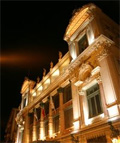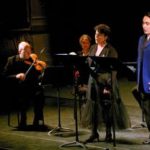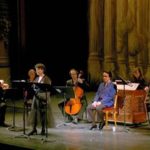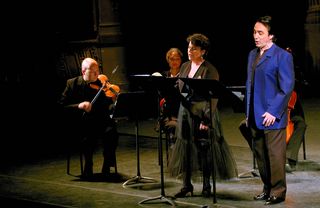
As part of the tercentenary of the birth of Giovanni Battista Pergolesi, the Ensemble of the Société de Musique Ancienne gave a magnificent concert on Saturday, April 10, 2010, at the Opéra de Nice. The program, presented with dynamism and intelligence by Gilles Cantagrel, included a Salve Regina by Alessandro Scarlatti, a “recently discovered” piece in this repertoire of an “indefatigable traveler” mostly composed of operas and church music. A piece that offers a “synthesis of different influences,” including that of Spain. Six movements ranging from “contrition” to “imploration,” notably the third movement, a superb “Largo” during which Soprano Claire Gouton and Contralto Michel Géraud offer a melodious and very moving intertwining of their voices.
Among the six hundred concertos and the hundred operas by the second composer honored that evening, a “meditation,” a wordless piece of music by “priest Antonio Vivaldi,” was presented: “one of the most original in the composer’s work,” as these two short movements nonetheless contain relatively daring tones and tempos for the time.
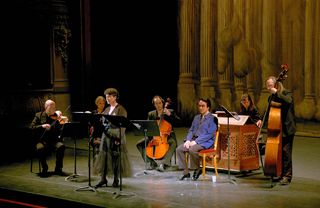
Finally, the Ensemble of the Société de Musique Ancienne gave a very refined interpretation of Pergolesi’s Stabat Mater, a composer so appreciated, as Gilles Cantagrel reminded, that one would “compose under his name to better sell the score.” A work made all the more touching because it was completed shortly before its author died at the age of 26. Attentive to the harmony of the instruments, the liveliness of the attacks, and the multiple nuances in the execution, the first violin Flavio Losco conducted with his Ensemble (Nirina Bouges on second violin, George Jalobéanu on viola, Etienne Mangot on cello, Jean-Paul Talvard on double bass, and Michaëla Chetrite on organ) these twelve pieces in happy harmony with the voices of the two soloists. Among these, we notably mention the “Fac ut portem Christi mortem” sung with impressive vocal depth by the Contralto and a very noble final duo “Quando corpus morietur” which ends with a particularly redeeming “Amen.”
